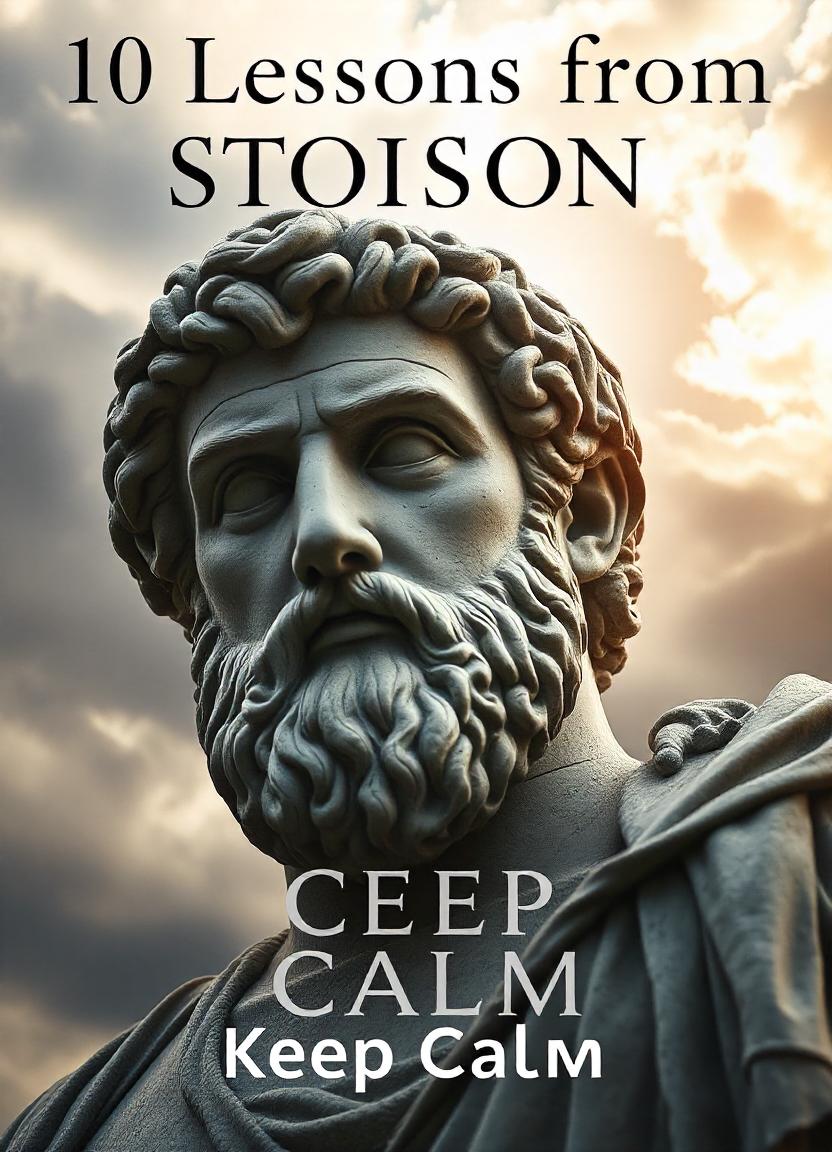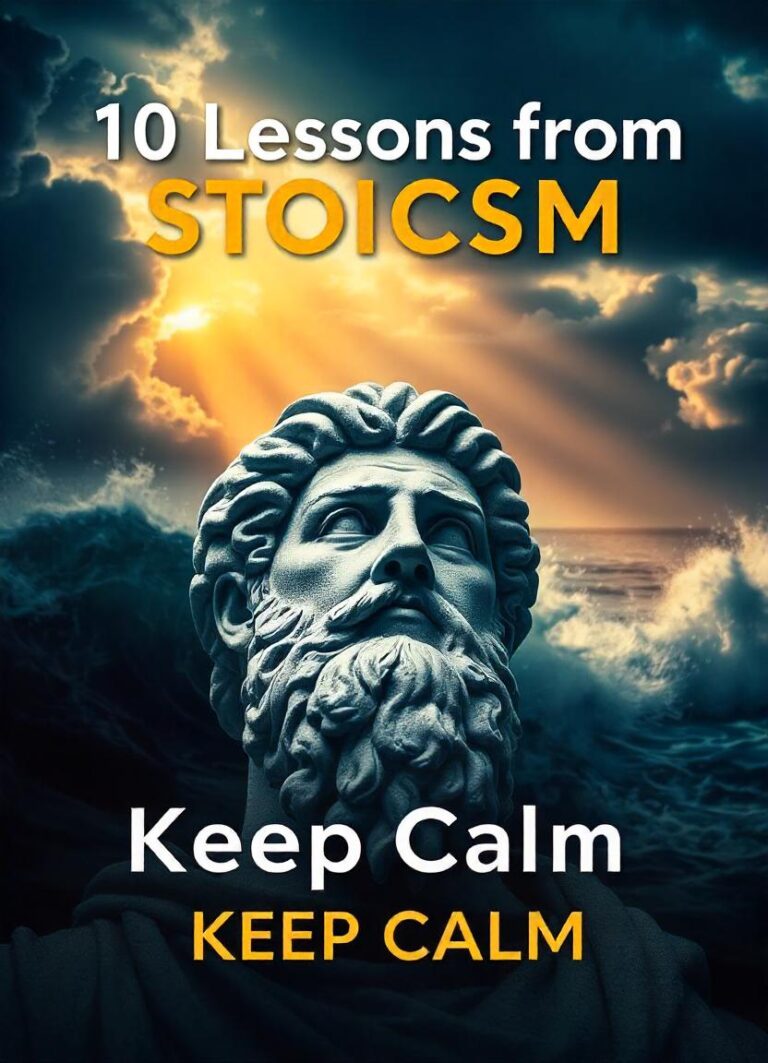Stoicism—an ancient philosophy, powerful and timeless. At the heart of this philosophy is Marcus Aurelius, the Roman emperor who, amidst wars, plague, and constant strife, stood unshaken. His wisdom, chronicled in his personal reflections Meditations, reveals a roadmap for living with strength, resilience, and an unshakable calmness, even when life throws its hardest punches.
In a world that feels like it’s spinning out of control, the principles of Stoicism offer a way to stay grounded. Let’s dive into 10 lessons from this timeless philosophy, and how you can apply them to keep calm and grow stronger, regardless of the storms you face.

1. Conquer What You Can Control
Stoicism teaches us that much of what happens in life is beyond our control. This idea might seem disheartening at first, but it’s a source of immense strength. Marcus Aurelius reminds us that what truly matters is not the external forces at play but how we respond to them. We cannot stop the storm, but we can decide whether we’ll stand firm or be swept away.
When life feels overwhelming, ask yourself: What can I control? Can I control the actions of others? No. Can I control the outcome of every situation? No. But you can control your reactions, your thoughts, and the way you choose to navigate each challenge. This is where your true power lies.
2. Let Go of What You Can’t Control
The weight of the world is often too much to bear because we cling to things that were never ours to control. When life hurts, it’s usually because we’re investing our energy in things that are beyond our influence. Marcus Aurelius teaches us to release these burdens. The world may not unfold the way we wish, but peace comes when we stop trying to force it.

Imagine holding a rope tied to a boulder. As long as you pull, the weight drags you down, consuming all your strength. The solution? Let go. By caring less about what you cannot control, you free yourself to focus on what truly matters—your mindset, your actions, your character.
3. Embrace the Power of Acceptance
Acceptance is not surrender. It’s strength. Life will throw obstacles your way—sometimes more than you think you can handle. Yet Marcus Aurelius saw these challenges as gifts, opportunities to practice virtue. Accept what you cannot change, and you’ll find a calmness that no external force can disturb.
He famously said, “The impediment to action advances action. What stands in the way becomes the way.” This means that the obstacles in your path are not things to avoid, but to embrace. They are opportunities for growth, not threats to your well-being. Accept the struggle, and you will turn it into strength.

4. Focus on the Present Moment
Worry about the future is a thief. It steals your peace, drains your energy, and clouds your judgment. Marcus Aurelius knew this well, reminding us that the future does not exist outside of our thoughts. “We suffer more in imagination than in reality,” as Seneca once put it.
When you spend your time fixating on what might happen, you miss out on the only time you truly have—the present. It’s not the weight of the future that presses down on you; it’s how you handle this very moment. When you learn to focus on the now, you’ll find the strength to handle anything the future throws your way.

5. Release the Past
Like the future, the past is a realm outside our control. Marcus Aurelius reminds us that what has passed is gone. The past can no longer hurt you unless you allow it. It’s only our thoughts about it that keep the pain alive.
Many of us hold onto regrets, replaying mistakes or painful moments in our minds over and over again, hoping we can somehow change what’s already happened. But this is wasted energy. Marcus Aurelius would say: “It’s not unfortunate that this happened; it’s fortunate that I’ve remained unharmed by it.” The true power is not in changing the past but in how you choose to react to it.
6. Practice Virtue in Every Action
What is under your control, above all else, is your ability to practice virtue. In Stoicism, virtue is the highest good—it’s how you respond to every situation. Courage, wisdom, justice, and self-control are the four pillars of Stoic virtue. Every action, no matter how small, is a chance to embody these principles.
As Marcus Aurelius wrote, “No matter what happens, keep your soul free of corruption, of malice, of anger, of deception, of self-pity, of pretension, of discontent.” The external world may try to sway you, but your virtue is yours alone to control.

7. Resilience: Stand Firm Amidst the Storm
Life is unpredictable. The storm will come. But the Stoics believed that resilience is born not in calm waters, but in the fiercest gales. When adversity strikes, it’s your reaction to it that matters most. Marcus Aurelius faced immense trials—wars, plagues, and personal loss—yet he remained unbroken. His secret? The belief that adversity was an opportunity to exercise strength.
Resilience is not about avoiding hardship; it’s about enduring it with grace. When life knocks you down, remember that the Stoic way is to get back up, stronger than before.

8. Amor Fati: Love Your Fate
Amor Fati—loving your fate—is the Stoic ideal of embracing everything that happens, good or bad, as necessary and beneficial. Marcus Aurelius understood that we do not always get to choose our circumstances, but we can choose our attitude toward them.
To practice Amor Fati is to welcome whatever comes your way, not merely with resignation, but with love. Everything that happens, even the hardships, shapes you into who you are. Your fate is not your enemy; it’s your teacher.
9. Cultivate Gratitude

Gratitude is a powerful antidote to life’s struggles. Marcus Aurelius often reminded himself to be thankful for what he had, not to focus on what he lacked. He advised treating what you don’t have as nonexistent and appreciating the things you do have, imagining how much you would desire them if they were gone.
However, Marcus also warned not to become so attached to what you have that losing it would destroy you. Gratitude, in Stoicism, is about balance—appreciate what life gives you, but never cling so tightly that you cannot let go.
10. Care Less, Live More
Ultimately, Marcus Aurelius teaches us to care less about the things that do not truly matter, and to care deeply about the things that do. When life hurts, it’s often because we are giving our energy to things outside our control. We let external forces pull our strings, turning us into puppets of fortune.
But if we care less about the uncontrollable, those forces lose their power over us. We become free. Free to focus on what truly matters—our actions, our choices, our character. By caring less about the noise of life, we can live more fully, with purpose, calm, and clarity.
Conclusion: The Stoic Way

The teachings of Marcus Aurelius are a beacon of strength in a chaotic world. His lessons are not about suppressing emotions or becoming indifferent to life’s trials. Rather, Stoicism is about mastering your inner world—your thoughts, your reactions, your virtues. It’s about accepting the uncontrollable and focusing on what truly matters: your ability to grow stronger, calmer, and more resilient through every challenge.
As you navigate your own life, remember: The storm will come. You cannot control it. But you can control how you stand in its midst. And that’s where your true power lies.






















0 Comments